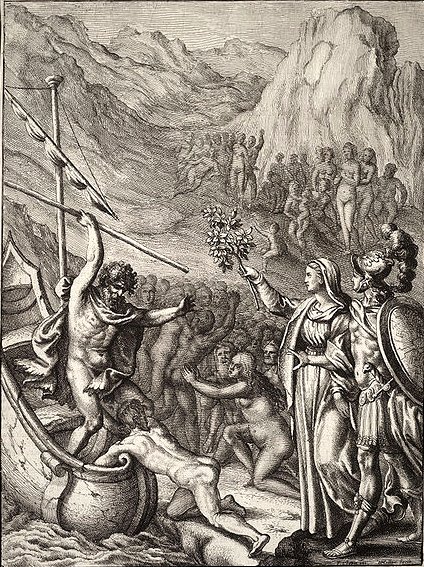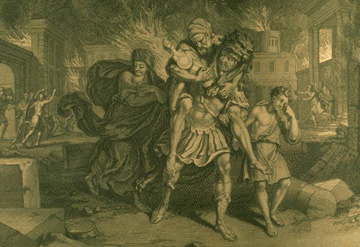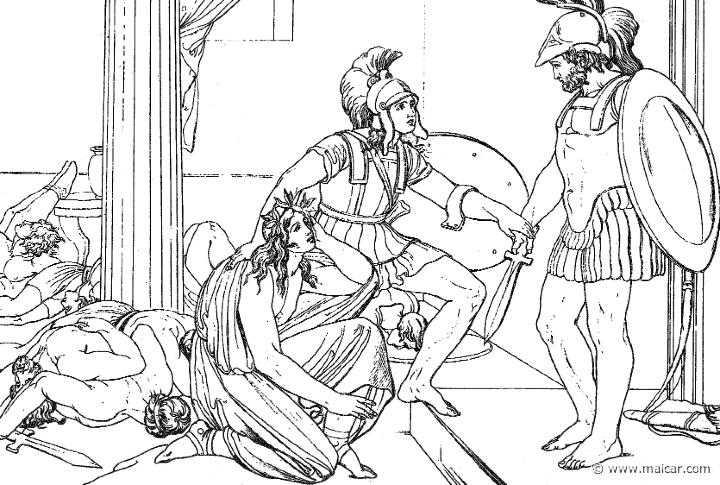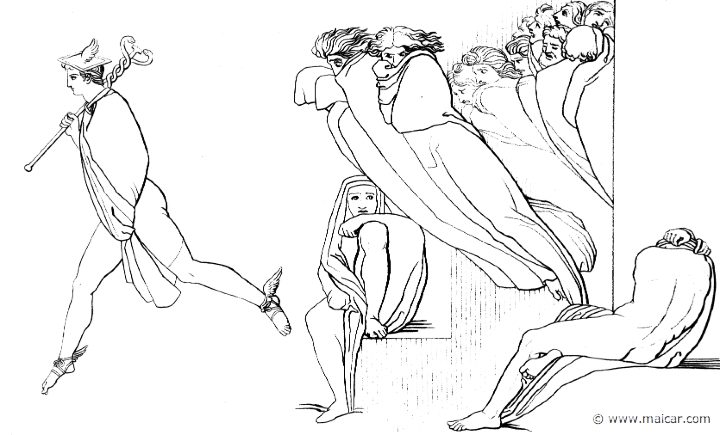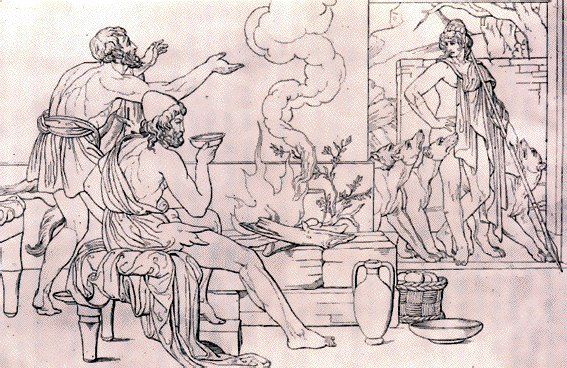"Never seek to marry your daughter to a Latin,
put no trust, my son, in a marriage ready-made.
Strangers will come, and come to be your sons
and their lifeblood will lift our name to the stars.
Their sons' sons will see, wherever the wheeling Sun
looks down on the Ocean, rising or setting, East or West,
the whole earth turn beneath their feet, their rule!" (106-112)
This was prophesied while the Trojans were on the banks of Latium. The men are driven by Jove to devour all the food and are driven to start eating their platters. Ascanius jokes that the men are eating their dishes and Aeneas is immediately struck by this event and remembers the sign Anchises gave his son to know what land they were to conquer. Aeneas prays to his parents and the gods while rumors spread among the Trojan ranks that this is the land that will be established by them.They explore the land and the city of Latium while Aeneas starts building. He sends some of his men to greet King Latinus. The King welcomes the men with
open arms, asks how they got to the land, he is also curious as to the wants of the men. Ilioneus assures the king they did not land on Latium by chance and ask for a piece of the land to settle on. The Trojans offer King Latinus gifts and promise that no harm will come to their city. Latinus offers the foreigners all they wish for, but remembering the omen offers his daughters hand in marriage to Aeneas, as well. Juno's wrath is viewed again, when she sees Trojan ships on the shore and men working the land. This goddess has a temper and can not truly understand when enough is enough. Her rage can only be quenched when Aeneas and his men have suffered long and hard. She is willing to let Aeneas marry the princess but she will do everything in her power to delay the whole affair and cause suffering along the way. Juno uses Allecto, mother of sorrows, to create havoc for the Trojans and Latins. Allecto uses one of her snakes and plummets it into the queens bosom and drives the queen mad. The queen, under the spell of Allecto, tries to convince Latinus not to marry their
daughter to a foreigner. The King's mind is made up and the queen storms off in a rage. Allecto's power create dissonance between the townspeople and their king. They become scared of what the foreigners will do to their precious land. Allecto then visits Turnus and informs him that his "...scepter's handed over / to settlers fresh from Troy!" (493-494). Turnus mocks Allecto's words because he does not believe them to be true. Allecto "ignites in[to a] rage" and makes Turnus turn in terror. The prophetess ignites a fire in the young King that hurls him into a war march on the Trojans and Latins. Ascanius ends up killing a prized stag of the shepherds, with the help of Allecto. The animal is able to retreat back to its caretakers before dying and through the help of Juno the herdsmen rally for war. With the help of Allecto a battle wages on between the herdsmen and the Trojans. This battle leaves many dead from both sides. Juno is pleased with Allecto's creation of chaos but summons her back home because she has no more use for the "mother of sorrow". The people of the town pressure the king to counteract this massacre and go into an all out war with the Trojans. Latinus stands firm in his resolve and feels like the gods are plotting against him. With continued outcry Latinus throws up his hands about the whole matter and tells the people the bloodshed is on their own hands. The kings reaction replicates that of Pontius Pilate in the Gospels. He knows if he sides with the crowd he is doomed; however in that moment the crowd will not allow for any other decision. Latinus refuses to open the Gates of War for the people, so in order to continue in her havoc Juno opens the gates herself. The book closes with descriptions of warriors that Turnus leads to battle including a woman warrior.
Book Eight begins with Turnus rallying the whole land of Latium to fight against the Trojans. Aeneas is overwhelmed so he sleeps and the god of the river, old Tiber, visit Aeneas. He tells Aeneas there is nothing to be afraid of and explains to the warrior how the Trojans will win the war. Aeneas wakes up and prays to old Tiber and the nymphs for protection. While preparing his ships Aeneas sees a bright, white sow with her brood, this animal was prophesied by old Tiber and is used as a sacrifice to Juno. The men sail on Tiber's river in order to reach the city of Arcadia in order to form an alliance. With the help of the river god they make it safely to their possible allies. The Trojans are greeted by fear from the townspeople. Considering they showed up in a ship ready for war I would be leery of them as well. Aeneas extends peace to the land and ask to see their king, Evander. Aeneas tells Evander of their connections through blood lines and ask for
help with their fight against their common enemy, the Latins. Evander gladly becomes allies and asks the men to join them in the towns celebration of annual rites. After feasting Evander tells the visitors what started these festivities. The story is that of Hercules eliminating the threat of the monster, Cacus, from the town. After explaining the purpose of the feast, the king and his visitors eat and drink more until the time comes for the priests to join the festivities. The priests reenact the battles of their beloved Hercules. "With the holy rites performed in full, / they turned back to the city" (362-363). During their travel back King Evander tells many stories "...of the men of old" (368). He tells Aeneas how this land became unified and the significance behind different artifacts. Specifically he shows Aeneas the Altar of Carmentis, who was the first nymph to "...foresee the greatness of Aeneas' sons" (399). Evander takes Aeneas to his home where they all fall asleep. Jump to Venus. She begs her husband, Vulcan, to craft weapons for Aeneas to protect him in this inevitable war. Not only does she beg but she uses her beauty to seduce an answer out of Vulcan. Surprisingly enough she believes her deception to be working but Vulcan calls Venus out and tells her that if she had been this passionate about the Trojan war with the Greeks the outcome may have been different. They fall asleep in each others arms and the next morning Vulcan heads to his home, a volcano. Vulcan tells the Cyclops to stop working on there current projects and all focus on making armor for "...a man of courage!" (520). Jump back to King Evander and Aeneas. The king awakes from his sleep and find Aeneas also awake. The men finally have a serious discussion about the upcoming war. Evander tells Aeneas of neighboring lands who tried to attack Turnus before but were stopped by the gods who warned them that a foreigner must lead them. The King ultimately believes that Aeneas is that leader and gives a few warriors
from his own village to help Aeneas in the battle. He also has Aeneas take Pallas, the prince, with him in order to educate the young man in the art of war. Aeneas is leery of the whole ordeal and only after Venus sends a sign does he truly believe in his ability to fight. The men return to the bank they originally landed on and gear up for war. Evander draws out his goodbye to Pallas and reminisces about his time in battle. The men march on land for a day. When they come to a resting point Venus catches her beloved son by himself. Venus presents Aeneas with the gift of armor. He delights in the craftsmanship of each piece and specifically notices the shield. The shield is significant because it depicts the story of "...Italy, Rome in all her triumphs" (739). The last few pages of the book describe this magnificent piece of metal-work in detail.
Book Nine beings with Iris telling Turnus to attack the Trojan camp. The main reason being because Aeneas is away finding comrades to help fight their enemy. Turnus heeds this advice and attacks the camp. Under orders from Aeneas the Trojan's retreat into the walls of the camp for safety. Turnus can not stand waiting outside the camp walls for the Trojans. Virgil describes him as a hungry wolf waiting for a sheep.
Because he does not find a weakness in the Trojan fortress, Turnus resolve to burn their fleet. The fleet has been blessed so that it will never be destroyed by human hands. Berecynthian Mother of Gods, pleaded with Jove to grant her prayer. The ships were built with wood from Berecynthian's forest. Her plea,
Nisus and Euryalus, Trojan warriors, are eager for glory amongst their comrades. The two young soldiers asks Ascanius and the council if they can try and slip past enemy lines in order to get word to Aeneas. They are granted this wish and promised gold, women, servants and more if they complete the mission. Ascanius promises that if they die on the mission their families and kin will receive the promised gifts. The two head out and create a bloodbath amongst the drunk, sleeping enemy. Euryalus takes pieces of Rhamnes' armor as they pass by his body. This proves to be fatal, because as the two Trojans escape into a wooded area a troop of cavalry from the Latin city pass by and see the helmet glint in the moonlight. The calvary try to stop the young men and question them but they boys run away. Nisus is able to escape; however, when he turns back to find his friend he hears the shouts of Euryalus being captured. His captors use Euryalus' death as a way to lure Nisus out of hiding. After trying to free his friend the young warrior is also killed, but only after slaughtering some of the Rutulians. The two warriors' heads are placed on "pikestaffs" and are paraded around in order to taunt the Trojans. Euryalus' mother is overcome with grief and shouts out for the whole world to hear about the desperation she feels because of her son's death. After her outcry an all out battle begins against the Trojan fortress. Turnus is able to attack with a flaming torch and opens up a hole into the Trojans' defenses. There is an abundance of killing and Ascanius gets his first taste of a real battle. After being mocked by Numanus for his style of fighting Ascanius prays to Jove for "...assent to the daring work [Jove] has in hand!" (712) and he slaughters the prideful warrior. The young prince is applauded for his courage and is fated to have many more profitable years of killing from Apollo. The god also tells Ascanius to retreat for another day but, the men keep on fighting. The killing continues throughout the battleground and Turnus finds a whole in the ranks. He uses it to get past the Trojan defenses in order to sneak into their camp. The Trojan gates are closed in order to keep out the enemy, but, sadly Turnus was only noticed after the gate had been closed. After much carnage from the hands of Turnus the Trojans band together and corner the fighter. The book ends with Turnus' narrow escape through the waters of the Tiber river.
 |
| http://www.mythindex.com/ roman-mythology/L/Latinus.html |
 |
| http://commons.wikimedia.org/wiki/ File:Alecto_Rousing_Latinus_Against_Aeneas _LACMA_65.36.1.jpg |
Book Eight begins with Turnus rallying the whole land of Latium to fight against the Trojans. Aeneas is overwhelmed so he sleeps and the god of the river, old Tiber, visit Aeneas. He tells Aeneas there is nothing to be afraid of and explains to the warrior how the Trojans will win the war. Aeneas wakes up and prays to old Tiber and the nymphs for protection. While preparing his ships Aeneas sees a bright, white sow with her brood, this animal was prophesied by old Tiber and is used as a sacrifice to Juno. The men sail on Tiber's river in order to reach the city of Arcadia in order to form an alliance. With the help of the river god they make it safely to their possible allies. The Trojans are greeted by fear from the townspeople. Considering they showed up in a ship ready for war I would be leery of them as well. Aeneas extends peace to the land and ask to see their king, Evander. Aeneas tells Evander of their connections through blood lines and ask for
 |
| http://en.wikipedia.org/wiki/Evander_of_Pallene |
 |
| http://historyoftheancientworld.com/2009/ 12/vergils-aeneid-viii-and-the-shield-of-aeneas -recurrent-topics-and-cyclic-structures/ |
Book Nine beings with Iris telling Turnus to attack the Trojan camp. The main reason being because Aeneas is away finding comrades to help fight their enemy. Turnus heeds this advice and attacks the camp. Under orders from Aeneas the Trojan's retreat into the walls of the camp for safety. Turnus can not stand waiting outside the camp walls for the Trojans. Virgil describes him as a hungry wolf waiting for a sheep.
"As a wolf prowling in wait around some crowded sheepfold,
bearing the wind and rain in the dead of night, howls
at chinks in the fence, and the lambs keep bleating on..." (Lines 68-74)
"May these galleys never be wrecked on any passage out
or overpowered by whirling storms at sea,
let their birth on our mountains be a blessing!" (106-108).
is answered by Jove. He states that the ships will not be burned but when the time comes they will turn into water nymphs. As Turnus and his men go towards the fleet a voice is heard from the sky that commands the ships to "Run free...you nymphs of the sea!" (137). The vessels snap their cables and sail out to sea. They dive underwater and resurface as beautiful, virgins. The Latins and their allies are amazed of this omen, but Turnus is not amused and speaks out against all of these "signs". He does not believe that they mean anything and he orders men to stand guard outside the Trojan fort while the Trojans continue to reinforce their walls.
| http://www.maicar.com/GML/ 000Iconography/Aeneas/slides/liebaen2.3.html |


